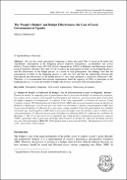| dc.contributor.author | Mukokoma, Maurice | |
| dc.date.accessioned | 2018-12-21T12:08:45Z | |
| dc.date.available | 2018-12-21T12:08:45Z | |
| dc.date.issued | 2010 | |
| dc.identifier.issn | 2010-1748 | |
| dc.identifier.issn | http://dx.doi.org/10.4314/jssd.v3i1.67758 | |
| dc.identifier.uri | http://hdl.handle.net/20.500.12280/1300 | |
| dc.description.abstract | All over the world, participatory budgeting is being advocated. This is based on the belief that
stakeholders’ participation in the budgeting process improves transparency, accountability and service
delivery. Using evidence from 105 Civil Society Organisations (CSOs) in Kabalore and Kamwenge district
local governments, therefore, this study set out to analyse the participation of CSO’s in the budgeting process
and the effectiveness of the budget process, as a result of such participation. The findings were that the
participation of CSOs in the budgeting process is still very low and that the relationship between this
participation and effectiveness of the budget process is very weak (spearman’s correlation coefficient = .08).
Therefore, it is recommended that relevant organisations build the capacity of CSOs to participate in the
budgeting process, to secure the benefits of budget effectiveness associated with such participation. | en_US |
| dc.language.iso | en | en_US |
| dc.publisher | African Journals Online | en_US |
| dc.rights | Attribution-NonCommercial-NoDerivs 3.0 United States | * |
| dc.rights.uri | http://creativecommons.org/licenses/by-nc-nd/3.0/us/ | * |
| dc.subject | Participatory budgeting | en_US |
| dc.subject | Civil society organizations | en_US |
| dc.subject | Democratic governance | en_US |
| dc.title | The ‘People’s Budget’ and Budget Effectiveness: the Case of Local Governments in Uganda | en_US |
| dc.type | Article | en_US |



